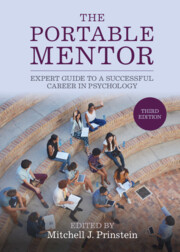Book contents
- The Portable Mentor
- The Portable Mentor
- Copyright page
- Dedication
- Contents
- Figures
- Tables
- Boxes
- Contributors
- Preface
- Acknowledgments
- Part I Applying to Graduate School
- Part II Beginning your Career
- Part III Your Research/Academic Career
- Part IV Your Career as a Practitioner
- Part V Your Professional Service Career
- Part VI Your Career After Graduate School
- Index
Index
Published online by Cambridge University Press: 21 July 2022
- The Portable Mentor
- The Portable Mentor
- Copyright page
- Dedication
- Contents
- Figures
- Tables
- Boxes
- Contributors
- Preface
- Acknowledgments
- Part I Applying to Graduate School
- Part II Beginning your Career
- Part III Your Research/Academic Career
- Part IV Your Career as a Practitioner
- Part V Your Professional Service Career
- Part VI Your Career After Graduate School
- Index
- Type
- Chapter
- Information
- The Portable MentorExpert Guide to a Successful Career in Psychology, pp. 578 - 588Publisher: Cambridge University PressPrint publication year: 2022
- Creative Commons
- This content is Open Access and distributed under the terms of the Creative Commons Attribution licence CC-BY-NC 4.0 https://creativecommons.org/cclicenses/

